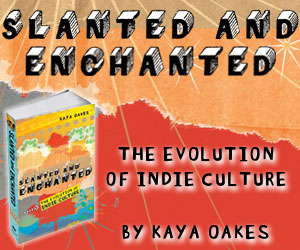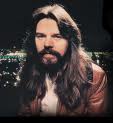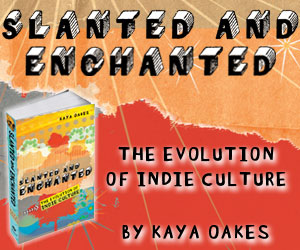The best side of who we are
Tomorrow on the HR Happy Hour show we will welcome Kaya Oakes, the author of Slanted and Enchanted: The Evolution of Indie Culture, and a writing instructor at the University of California, Berkley to the big show.
show.
Kaya also writes a cool blog at her site - Oakestown.
The show can be heard live from the HR Happy Hour show page, or via the call in line at 646-378-1086.
I picked up 'Slanted and Enchanted' a few months ago and once I had finished the book, I knew I wanted to try and book Kaya on the show. I wrote a blog post referring
When I told Kaya a little bit about the HR Happy Hour and asked her to appear on the show, she graciously accepted but had to wonder, I think, why a show that (allegedly) focuses on Human Resources and Talent Management would want to talk about indie culture.
A good question, but after thinking about the topic some more, I thought there were some really interesting and relevant parallels from the development and evolution of indie, and what is happening in the workplace and especially in the changes in traditional views of work and employment.
Networking - The pioneering indie artists relied on their strong personal networks of peers, fans, and friends in adjacent fields for support, promotion, and even basic survival at times. Indie and punk bands relied on each other to such an extent, and there was a strong culture of reciprocity that developed.
What is every recent graduate, job seeker, or for that matter experienced professional told these days? Networking, giving to your community of peers, and promoting the good work done by others are all seen as absolutely essential for long-term career and professional stability and success.
Entrepreneurship - A frequent theme of the book, and perhaps the single most important driver of indie culture is the belief that art that is created independently, for its own sake, and representing the personality of the artist alone while having little to no regard for its commercial viability possesses a purity and value that elevates it from mass produced and mass consumed junk. Kaya observes that 'art that evolves outside corporate America can and does make a difference in the way people think.'
Who hasn't been touched in a personal way by the deterioration of the American economy in the last two years? The traditional bonds between corporations and employees have probably never been weaker. In an economic climate that smacks of 'it's every man/woman for themselves', the idea of collecting your ideas, talents, and personal drive and trying to package, promote, and sell them to the marketplace has become so much more resonant and important. So maybe you are not out there 'selling' two-minute songs and T-shirts, but the mindset and drive needed to make it as a professional entrepreneur are not at all unlike what is needed to pack up the van with instruments and amps and hit the road.
Creativity - The indie artists, mostly by virtue of the lack of restrictions and influence of outside interests like big record companies or major publishing houses, were free to unleash their creativity and passion as they saw fit. Exploration into new sounds, sources, and inspirations were all common, they did not ever feel compelled to follow the rules and stay within the lines. It values the contribution and creativity of each individual.
This week the results of an IBM study were released that indicated the most important leadership quality for success in business is creativity. More important than integrity or global perspectives, creativity is seen by CEO's themselves as essential for their own, and their organization's success. How does the organization find more creative people, and encourage the development of more creativity from it's existing ranks? Could it be that a better understanding of indie and the people that are motivated to create would be high on any executive or HR leader's list?
I hope I have made the case for the link of indie to HR and the workplace. I hope you can join us on the show tomorrow night at 8PM EDT.
Note - The title of this post comes from the below video, where Dale Dougherty of Make Magazine describes the Maker Faire festival, and talks about this culture of creativity as demonstrating 'The best side of who we are'.

 Steve
Steve


